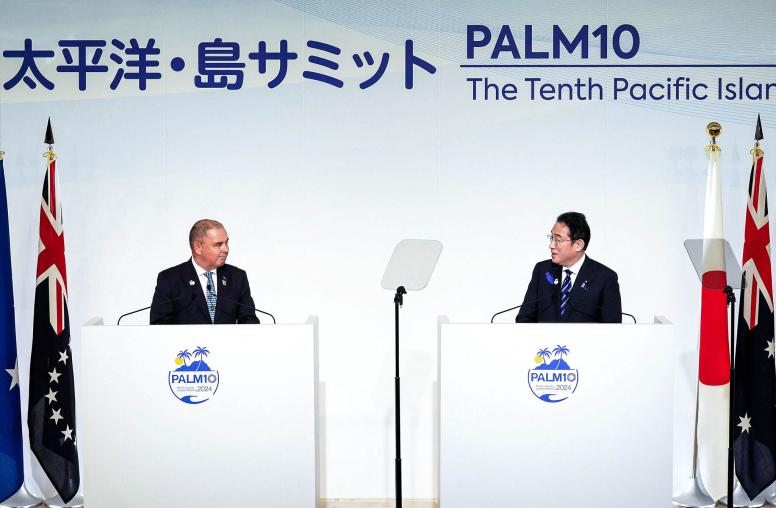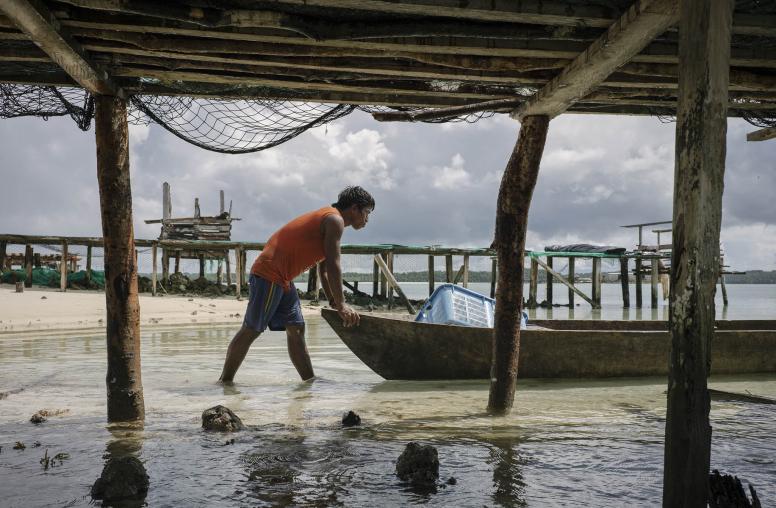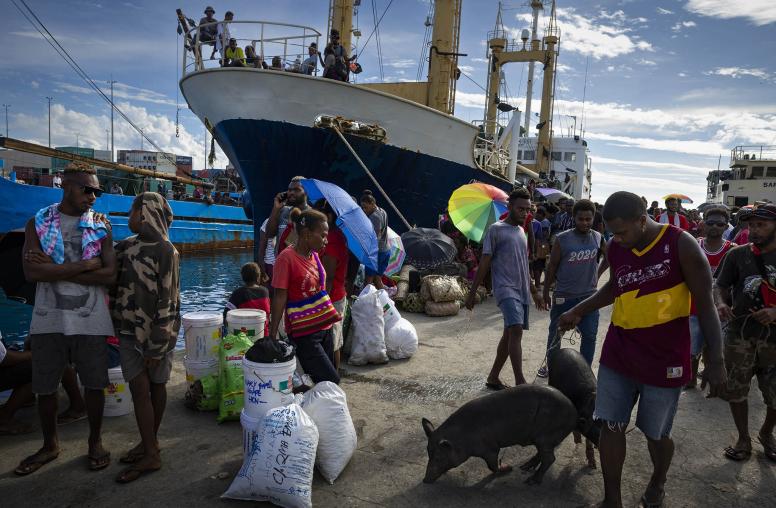The Success and Sidelining of Women Peacebuilders in Solomon Islands
Solomon Islands women are cultural symbols of peace — but that hasn’t translated into decision-making roles.
During the height of “The Tensions” in Solomon Islands — an armed civil conflict from 1998 to 2003 — women were thrust into the role of peace symbol, negotiator, trauma counsellor and mediator. Women often went in between the two warring sides to negotiate safe trade and movement of people, encouraged militants to give up arms, and led meetings and marches for peace.

However, once the Regional Assistance Mission to Solomon Islands (RAMSI) facilitated a government-led peace process in 2003, women leaders were sidelined in official processes while men cemented their roles as power-brokers and beneficiaries of government programs.
In the 20 years since, women and women-led organizations have continued to advocate for an increased role. And while they’ve found some success at the local level, owing to their history as religious and cultural symbols of peace, their participation in governance and decision-making has been continually denied.
Understanding Leadership Roles in Solomon Islands
Pacific scholars Sanga and Reynolds present a framework for understanding leadership in Solomon Islands through three spheres of influence: the cultural, the religious and the institutional (governance).
Applying this to women, we see that they can access leadership roles in two of the three spheres: Religiously, where women like Reverend Marita Tahu played important public roles during The Tensions, and culturally, where women such as Alice Pollard and Ruth Liloqula helped organize the initial women-led peace negotiations during The Tensions and took on leading roles in indigenous organizations.
Over the course of 12 interviews with women from the towns of Boeboe and Chipikopi, I found that, today, these communities still see women as symbols of peace, with broad public consensus that they have a role to play in conflict resolution.
However, that symbolism still relies on religious and cultural norms, and women’s roles in peace are most visibly seen in community programs rather than in political or governance decision-making. There are some who have broken through, though. In the particularly male-dominated space of land-use decisions, many women have found an ability to influence proceedings. But this is still a peripheral, rather than power-holding, role.
Women Step Up for Peace
That women in Solomon Islands have struggled to gain recognition in formal governance is not for a lack of effort — nor is it from a lack of peacebuilding skills. As the history of groups like Women for Peace show, not only did women contribute to ending The Tensions, they paved the way to a viable peace process.
The Women for Peace (WFP) group was born out of a roundtable held in May 2000, where women resolved to search for a way to end the conflict by consolidating their ideas and addressing matters of interest for women.
The group eventually boasted a membership of approximately 300 women from various organizations, provinces and government ministries who met weekly for prayers and announcements. WFP organizing included women from all walks of life, who came together and celebrated diversity while pursuing the cause for unity.
The first notable action the group took was collecting food for about 1,000 Guadalcanal refugees — all women and children — at the height of The Tensions.
The provision of food became a distinct method used by WFP to encourage peace. Roadblocks were common during the worst periods of The Tensions, with people and towns cut off from one another regularly, halting goods and isolating those in rural agricultural areas.
WFP recognized the importance of food security for both the townspeople and those who live outside of the roadblocks, and as part of the group’s efforts to help broker peace, WFP would facilitate the exchange of store-bought food in towns with garden produce grown by those in rural areas. In doing so, they built relationships with armed militants and established some trust and confidence with them that they were later able to use to encourage participation in peace processes.
The objectives of the WFP quickly expanded and aimed to secure the active participation of women in the RAMSI peace process and engage women at all levels in search for peaceful solutions. WFP also called for both local and international support for peace, networking with civil society overseas and local political actors to advocate for better governance to meet the needs of citizens.
Unequal Participation by Women in Conflict Resolution Processes
Despite the efforts of women-led groups like the WFP, no women were present when the Townsville Peace Agreement was finally signed. The women’s submission to the Solomon Truth and Reconciliation Commission pointed out that despite women and children overwhelmingly representing the victims of violence, women were relegated to roles of food preparation for peace and reconciliation talks rather than participation in decision-making discussions.
RAMSI too was late to employ a gender advisor or name specific gender objectives. By the time the topic was seriously broached, men had cemented control of the parliament and government ministries responsible for law and order, making difficult for women to have impactful influence on the government.
Additionally, issues that affected women, such as rape and sexual harassment, have not seen specific redress — whether as part of the peace process or in the years since — although there have been some investments made in gender-based violence law reform and services since The Tensions.
A national Women’s Peace and Security Action Plan was created, but remains little known, even within many of the ministries responsible for implementing it, and most of its objectives remain unimplemented.
Moves to formalize women’s participation in governance, such as through quotas for seats in parliament, have been resisted and failed — although at the provincial level there have been some commitments to increasing women’s input into assembly and executive institutions.
How to Elevate Solomon Island Women
There are a few important lessons learned from the experience of women in Solomon Islands.
First of all, there is an ongoing need to recognize and mobilize the skills and expertise women exhibited during The Tensions to fill in the gaps in the remaining elements of the peace process.
WFP’s ongoing work demonstrates women’s networks and organizing remain active in the civil society sphere. The energy of groups like Women for Peace needs to be channeled into official peace and recovery processes.
Increased monitoring and reporting of whether women are included or left out of decision-making is required so that implementers of policies like the Women’s Peace and Security Action Plan can be held to account.
Secondly, leadership can promote women’s participation in all three domains of influence in Solomon Islands: church, cultural and government.
Women’s peacebuilding presence is currently felt the most in community-level conflict prevention, reconciliation and peacemaking. These endeavors often also involve chiefs, churches and youth. These other actors in local level initiatives can do more to recognize and monitor women’s roles, and in doing so they can help women expand their influence from a place of high regard and begin impacting decision-making from the bottom-up.
Moving forward, women need to be more visible not just at the local level, but in national governance and official peace processes. Recognizing women as peacebuilders, the Solomon Islands government and its partners should look at giving women recognition and roles in more peaceful and inclusive approaches to nation-building.
Ruth Maetala is the founder and director of Dignity Pasifik, a women-led research firm in the Solomon Islands.



